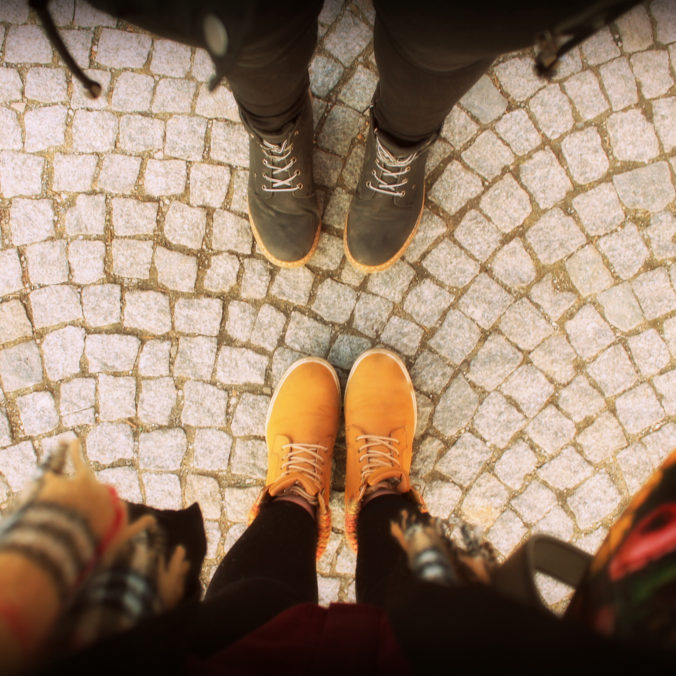Deep down, I believe that an authentic life isn’t one that’s impeccably curated. Try as we may, circumstances and people will continually push our boundaries. And that’s totally fine.
I think that we all have, somewhere in our life, someone (or many people!) who have the power to drive us up the wall. Often, these are people close to us: family members, friends, colleagues, neighbours—people whom we can’t, and often don’t want to, exclude from our life.
If I’m only to speak for myself, I can tell you that I certainly do have meaningful relationships with people who systematically trigger me, yet hold an important place in my life. And as much as I want to keep them around, I also want our interactions to be better and more peaceful.
So what is there to be done?
SPACE & BOUNDARIES
If we want to maintain healthy relationships with the people around us, even when they are pushing our buttons, we need to establish a solid practice in two intrinsically connected areas:
- Creating and maintaining healthy boundaries;
- Holding space, both for ourselves and for others.
When we hold space for others, we allow them to show up as they are, without any assumptions or judgment on our part.
We’re not trying to “fix them” or to assert control over the outcome of whichever situation they’re in.
We deliberately let them make different decisions than the ones we would have made, and have different experiences than we would.
Obviously, this may not come easily at first. But, as I mentioned above, it’s a practice. Which entails that there is a learning curve, and that there will be good days and… less good days. That’s what it’s all about!
When we feel good about the choices we’re making and when we’re engaging with the world from a place of worthiness rather than scarcity, we feel no need to judge or attack.
Brené Brown
It will obviously happen that others’ actions, words or choices may come in direct opposition with what we believe, how we would react. And that’s usually when this whole holding space thing becomes challenging.
This is why, in order to even begin to hold space for others, we absolutely need to hold space for ourselves first.
When we are confronted with the way someone else experiences or expresses something, that shaken up feeling, that urge to strongly react should be a pretty clear signal that something is up… with us!
What is it about their choices or their words that is getting us so worked up? Why are we taking it personally?
The answer typically lies within our own vulnerability; if we’re willing to mindfully tap into it, we can gain a lot of clarity. This is why it’s so important to hold space for ourselves: it’s the space where authentic vulnerability can be expressed.
Once we’ve identified what gets us worked up about their situation, we can work on letting it go.
But what about boundaries? Where do they come into play?
Well… exactly here!
For some, the notion of boundary can seem hostile, and akin to the one of a wall or a fence. But that’s not what boundaries are.
Boundaries are the way we recognize where we end, and where the other starts.
Not only are they healthy, they actually make for stronger relationships all around.
Boundaries are what help us distinguish our own reaction—which should be entirely within our control—from the situation which has triggered it—which may not be something we can control at all. They can help remind us that we are whole beings, and therefore that others are, as well.
THE BEAUTY OF AUTONOMY
Often, we believe that we react strongly because we care... and, in fact, we do!
But think of it this way: wouldn’t you want the people around you to recognize that you have the autonomy to make your own decisions, to have your own process and to feel your own feelings?
Then why do we struggle so much with granting others the same autonomy?
By holding space for others, we recognize that we have no business trying to direct their own process, and allow them to do so, whatever that ends up looking like.
Actually, I often find myself repeating this: This is about them, it’s not about me. I can only hold space for them.
In turn, it also means recognizing that, my own reaction is entirely about me, and has very little to do with them.
Do the best you can until you know better.
Then when you know better, do better.
Maya Angelou
You can’t resent people for not being where you are on the journey.
Ultimately, whether we realize it or not, we’re all simply doing our best, no matter what that looks like.
Pulling on a plant will never successfully hasten its growth—why should that work with people?
Make sure you’re signed up as part of my Special Crew to get my very best stuff: juicy insight, free workouts and recipes, special discounts, etc. You don’t wan’t to miss out!

